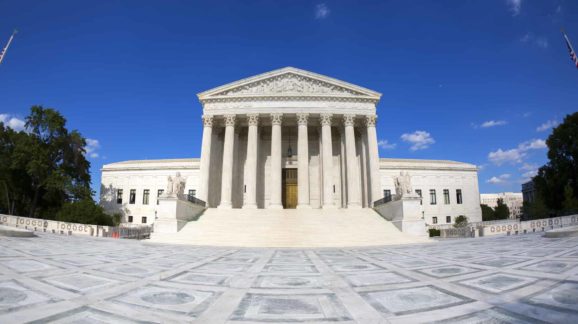Don’t Fear Worker Freedom
Unions won't be doomed if the Supreme Court decides to free workers from compulsory dues.
PUBLIC SECTOR UNIONS have some dire warnings about a U.S. Supreme Court case that could end forced union dues for government employees, like teachers, police officers and firefighters. According to some union officials, giving workers a choice to decline paying fees to a union, while allowing them to stay in their jobs, is part of a strategy to deplete union coffers. On Monday, the court heard from Mark Janus, a child support specialist in Illinois who argues that forcing public employees to pay these fees violates their First Amendment rights.
It’s understandable why Janus feels that way, because it’s no secret that government unions are inherently political. Collective bargaining in the public sector is indistinguishable from lobbying by any other narrow interest. Most items bargained over in the public sector, such as pay, teacher tenure and pension funding, involve political choices that determine how tax dollars are spent.
In 22 states, like California, New York and Illinois, unions are empowered to speak and negotiate on behalf of workers, whether they like it or not. According to Janus, he doesn’t want to pay for a union or activities that don’t represent his values and interests, but he has no choice in the matter if he wants to keep his job.
Unions may fear a favorable outcome for Janus because it would effectively end compulsory dues for public sector workers and thus create an environment where state and local workers, not the government, will decide if a union is worthy of their financial support. Even Justice Sonia Sotomayor questioned whether the lawsuit amounted to an effort to “do away with unions.” Nothing could be further from the truth. Unions more than likely would see a slight drop in revenue, but not in the amount that would do away with unions or lead to their extinction. Instead, a ruling in favor of Janus will give state and local government workers some control over where their hard-earned money is going and who represents their interests.
Unions also worry that, when given the choice, workers will not pay dues since either way they will continue to receive union representation. This is because labor unions act as “exclusive bargaining agents,” meaning they must represent all workers in a bargaining unit whether or not they are full-fledged dues paying members. But that fact is, the majority of workers stay union members when given the option.
According to the Bureau of Labor Statistics, unions fare well in “right-to-work” states, where private-sector workers have the right to choose whether to pay union dues. Data compiled by the Mackinac Center for Public Policy show union membership rates in those states are comparable to states that require forced union dues. For example, from 2000-2014, “the average percentage of union-represented, private-sector employees who were full union members was 93 percent in agency-fee states, 94 percent in mixed-status states, and 84 percent in right-to-work states.”
In Michigan and Wisconsin, where right-to-work laws have been recently passed, union membership among public-sector employees covered by collective bargaining agreements remains above 90 percent. This data should alleviate union concerns that members will stop paying dues in droves once they are given a choice. But consistently, unions fight tooth and nail to stop so-called “free-riders” from opting out.
Unions shouldn’t be able to have it both ways. Either free workers from forced union representation entirely or accept that some workers may not want union representation, and allow them to opt-out of paying dues.
No worker should be forced by the government to financially support a union or risk losing their job. This is what is at the heart of the case before the Supreme Court. It’s ultimately about worker freedom, and not defunding unions.
The only thing unions really have to fear from the court’s forthcoming decision, is the possibility that unions will be held accountable to their membership. A ruling in favor of Janus will give workers the opportunity to opt-out of paying dues if they do not think union is earning its keep. Perhaps that is what’s really making union bosses uncomfortable.
